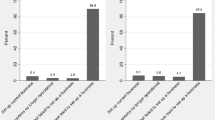Abstract
This paper investigates the determinants of entrepreneurial spirit as measured by parental preference of self-employment for male heirs in Japan since 1992 through a statistical analysis. In addition to the relevance of our findings for entrepreneurship research, this empirical study serves as a showcase for the rule approach of Dopfer and Potts in applied research. It helps to understand how self-employment has become a less and less desirable occupational choice since the abandonment of Japan’s high growth path in the early 1990s. For entrepreneurial spirit in Japan, business sentiment, interest rates (perceived cost of capital), changing family structures (declining number of siblings), and fear of unemployment are all identified to exert significant negative influence. While the former three are strongly significant during all of the investigation period (1992–2007), fear of unemployment is found to strongly influence entrepreneurial spirit in the general population from 1998 onwards only. The rule approach helps to motivate how agents have come to understand unemployment as a factor relevant for their economic lives in the course of the years following the burst of the Japanese bubble economy. Negative signs on both business sentiment, and on fear of unemployment relate to different subgroups of agents, namely to self-employed individuals (business sentiment), and to individuals in dependent employment (fear of unemployment). Improving business sentiment means higher viability of preferred occupational choice for the self-employed, whereas a higher degree of fear of unemployment discourages dependently employed individuals from embarking on the route of self-employment. Further findings include significant evidence that the nominal interest rate—rather than its real counterpart—likely influences entrepreneurial spirit in Japan.
Similar content being viewed by others
References
Acs, Z. and D. Audretsch (1994) “New-Firm Startups, Technology, and Macroeconomic Fluctuations,” Small Business Economics 6.6: 439–449.
Beinhocker, E. (2011) “Evolution as computation: integrating self-organization with generalized Darwinism,” Journal of Institutional Economics 7.03: 393–423.
Chen, P. (2005) “A Biological Perspective of Macro Dynamics and Division of Labor,” in K. Dopfer (ed.) The Evolutionary Foundations of Economics, Cambridge University Press, Cambridge, pp. 472–505.
Dopfer, K. (2001) Evolutionary Economics: Program and Scope, Kluwer Academic Publishers, Dordrecht.
Dopfer, K. (2005) “Evolutionary Economics: A Theoretical Framework,” in K. Dopfer (ed.) The Evolutionary Foundations of Economics, Cambridge University Press, Cambridge, pp. 3–55.
Dopfer, K. and J. Potts (2008) The General Theory of Economic Evolution, Routledge, London.
Dopfer, K. and J. Potts (2009) “On the Theory of Economic Evolution,” Evolutionary and Institutional Economic Review 6.1: 23–44.
Global Entrepreneurship Monitor (1999–2007) Executive Reports, London Business School and Babson College, London.
Harada, N. (2005) “Potential Entrepreneurship in Japan,” Small Business Economics 25.3: 293–304.
Kuraray, Inc. (1992–2007) “Survey on desired future profession,” Resource document. (http://www.Kuraray.co.jp/enquete/index.html). Accessed June 7, 2008.
Kuroda, Y. and T. Suzuki (1991) “A comparative analysis of the Arab culture: Arabic, English and Japanese languages and values,” Behaviormetrika 30: 23–44.
Leibenstein, H. (1978) General X-Efficiency Theory and Economic Development, Harvard University Press, New York.
Masuda, T. (2006) “The determinants of latent entrepreneurship in Japan,” Small Business Economics 26.3: 227–240.
NFRC (1999, 2004) National Family Survey, Japan Society of Family Sociology, National Family Research Committee, Tokyo.
NRI (1992–2007) Consumer Sentiment Index. Nippon Research Institute, Tokyo.
Otake, F. (2005) Inequality in Japan—Illusion and Future of the Divided Society, Nikkei, Tokyo.
Ostrom, E. and X. Basurto (2011) “Crafting analytical tools to study institutional change,” Journal of Institutional Economics 7.03: 317–343.
Schumpeter, J. A. (1939) Business Cycles: A Theoretical, Historical and Statistical Analysis of the Capitalist Process, McGraw-Hill, New York.
Strohmaier, R. (2010) “The General Theory of Economic Evolution,” European Journal of the History of Economic Thought 17.2: 352–356.
Author information
Authors and Affiliations
Corresponding author
About this article
Cite this article
Blind, G.D. Investigating Entrepreneurial Spirit with the Rule Approach: Why Self-employment is on the Decline in Japan. Evolut Inst Econ Rev 9, 183–198 (2012). https://doi.org/10.14441/eier.N2012008
Published:
Issue Date:
DOI: https://doi.org/10.14441/eier.N2012008




